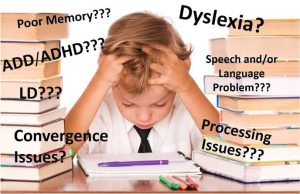Three Most Common Learning Disabilities in Children

Source: kids speak
Learning disabilities affect the ability to learn and understand properly what is being taught, which is important for every learner and child, who is currently being educated in any way. This is why children with learning disabilities are at a great disadvantage in their quest to get educated, learn a skill, or become very active in any social activity they are involved in. As a parent whose child is performing poorly in his or her academics, you need to be very aware of the various learning disabilities that a child can likely be facing. In this article, I will discuss with you, the three most common learning disabilities in children.
It is true that there are different specific learning disabilities, but they are broadly grouped into four categories. Those categories are;
- Spoken language listening and speaking
- Written language reading, writing, and spelling
- Arithmetic calculation and concepts
- Reasoning organization and integration of ideas and thoughts.
It will interest you to know that learning disabilities may be defined in practical, medical, and legal terms. I have just touched on the practical aspect.
What are learning disabilities?
Learning disabilities is a term that simplifies a lot of neurological disorders in learning. That is, learning disability is a term used to refer to a lot of psychological disorders. According to the LDA(Learning disabilities association of America), a learning disability is a disorder in one or more basic psychological processes that may manifest itself as an imperfect ability in certain areas of learning, such as reading, written expression, or mathematics.
Three Most Common Learning Disabilities
As broad as the term learning disabilities may be, there are specific ones that are very common among learners and children. As a parent, you should watch out for the three most common ones in your child that is finding it difficult to learn. They include;
- Dyslexia
- Dysgraphia
- Dyscalculia
Dyslexia
Dyslexia is a language-centered psychological disorder. A dyslexic finds it difficult to process information that is related to language. It makes it difficult for dyslexics to read, write and comprehend. Dyslexics may have difficulties with understanding words or lack phonemic awareness as well as finding it difficult to pronounce or identify individual sounds within words. Dyslexia leads to a child being unable to read, pronounce words properly,read comprehension, and will lack other language skills.
Dysgraphia
Dysgraphia is a learning disability that makes children or learners unable to communicate their thoughts in writing or drawing. As a result of this, Dysgraphics find it difficult to put their thoughts into any form of writing, be it spelling, grammar, vocabulary, storytelling, critical or analytical thinking, composition, or experiences. Their major problem is using their physical muscles and mental ability at the same time. Learners with dysgraphia do have issues with letter and word spacing while writing, constructing sentences, identifying things, calculating movements, and distance ( lack of spatial awareness). They find it difficult to think and act or write simultaneously.
Just to add, note that writing should not be done only when you feel inspired. This article on inspiration before writing will enlighten you more.
Dyscalculia
Dyscalculia is a learning disability that has to do with not being able to calculate. This means a child or learner with dyscalculia will have difficulties understanding math and anything related to it. A child or learner with dyscalculia will have issues with mathematical concepts, counting, numbering, reading clocks, money, reasoning, patterns, some basics in mathematics, and mental math.
As a parent whose child has learning disabilities, I advise you to commit all to God’s hand. For all that God does is for our good. This article titled: ‘Where is God in all these?’, will enlighten you more.
Conclusion
We should not neglect children and learners with learning disabilities. Like every other child without a learning disability, they still reserve the right to be educated. As a parent or teacher with a child or learner with a learning disability, you should learn how to manage them, and be aware of how to help a child with a learning disability.

